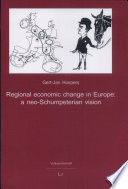 | David Scott - 2003 - 498 pages
...'Democracy is an institutional arrangement for arriving at political decisions in which individuals acquire power to decide by means of a competitive struggle for the people's vote'. [13] Thus, what is now taken to be central to democracy is not participation by all but competition... | |
 | Scott L. Althaus - 2003 - 388 pages
...writes: "The eighteenth-century philosophy of democracy may be couched in the following definition: the democratic method is that institutional arrangement for arriving at political decisions which realizes the common good by making the people itself decide issues through the election of individuals... | |
 | 2004 - 370 pages
...democratie is nog steeds de definitie die Schumpeter gaf in Capitalism, Socialism and Democracy: ". . .the democratic method is that institutional arrangement...by means of a competitive struggle for the people's vote" (Schumpeter 1966: 269). In deze opvatting van democratie wordt de rol van het electoraat eigenlijk... | |
 | Gert-Jan Hospers - 2004 - 222 pages
...strive for the common good, but rather aim to govern the masses. Seen from this economic perspective, 'the democratic method is that institutional arrangement...by means of a competitive struggle for the people's vote' (Schumpeter, 1942). We come back to this interesting part of Schumpeter's vision when discussing... | |
 | Ariel Armony - 2004 - 312 pages
...whole but occupies a smaller swatch of territory" (p. xiv). 6. As Joseph Schumpeter (1942) argued, "The democratic method is that institutional arrangement...by means of a competitive struggle for the people's vote" (p. 269). This minimalist perspective offers a measure to identify the presence or absence of... | |
 | Colin Copus - 2004 - 336 pages
...to do the deciding'. Indeed, democracy can be defined by the existence of institutional arrangements for 'arriving at political decisions in which individuals...by means of a competitive struggle for the people's vote'. 5 Inextricably linked to the electoral presumption is the notion of 'competitive elitism'; that... | |
 | Michael McFaul, Nikolay Petrov, Andrei Ryabov - 2010 - 378 pages
...direction. Defining Democracy and Dictatorship Following Joseph Schumpeter, we define democracy as "the institutional arrangement for arriving at political...power to decide by means of a competitive struggle." 3 We also concur with Adam Przeworski's refinement of Schumpeter by adding that this process of electing... | |
 | Clive Barnett, Murray Low - 2004 - 268 pages
...definitions of democracy derive from Joseph Schumpeter (1947: 269), who defined democracy as a system 'for arriving at political decisions in which individuals...decide by means of a competitive struggle for the peoples' vote'. This minimalist approach was adhered to by Huntington (1991). Dahl's (1971) concept... | |
 | Steven J. Hood - 2004 - 194 pages
...decisions are made are the key components toward understanding democracy. He argues that modern democracy is "that institutional arrangement for arriving at political decisions in which individuals acquire power to decide, by means of a competitive struggle for the people's vote."32 Dahl believes the characteristic... | |
 | Alina Mungiu, Ivan Krastev - 2004 - 300 pages
...Schumpeter's insight that democracy is a decision-making arrangement "in which individuals acquire power to decide by means of a competitive struggle for the people's vote." Robert Dahl has elaborated this definition by noting that democracy implies both 4. Included... | |
| |